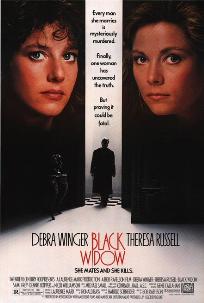 A silly eighties thriller with occasional flashes of interest, courtesy of actress Theresa Russell—but flashes are all we get.
A silly eighties thriller with occasional flashes of interest, courtesy of actress Theresa Russell—but flashes are all we get.
BLACK WIDOW, released in 1987, marked a breakthrough for Theresa Russell, being her first bonafide hit and propelling her into a (very brief) period of A-list stardom. It was a low point, alas, for director Bob Rafelson, known for iconic films like FIVE EASY PIECES and THE KING OF MARVIN GARDENS but here reduced to a director-for-hire on an early screenplay by Ronald Bass—who’d go on to become the most prolific screenwriter of the 1990s.
Alexandra Barnes is a Federal Investigator looking into the deaths of two millionaires. Both are survived by their young wives, who are actually one person: Catherine Peterson, a “black widow” who marries and then poisons one rich man after another. After Catherine offs her latest hubbie, a fiftyish electronics mogul, Alex decides to investigate Catherine—much to the consternation of Alex’s superiors, who are all apparently too dumb to notice that the wives of the murdered men are clearly same person.
Catherine is in the act of seducing her latest victim when Alex begins her investigation. Catherine senses Alex’s presence and hightails it to Hawaii, where she wastes no time snaring a French himbo named Paul. Alex follows, and strikes up an immediate friendship with Catherine. Yet despite the undeniable chemistry between the two woman Catherine is suspicious of Alex, especially when the latter begins romancing Paul.
Alex nearly loses her life in a couple of suspicious “accidents,” one involving an empty air tank she’s given by Catherine on an undersea dive and the other in a too-hot shower at Catherine’s house. Alex eventually tells Paul about Catherine’s deadly nature, by which point Catherine has changed her identity yet again…
With this film Bob Rafelson followed the lead of fellow innovator Arthur Penn, who like Rafelson made some standout films in the 1960s and 70s only to spend the 80s cranking out forgettable thrillers (in particular the middling DEAD OF WINTER, released the same year as BLACK WIDOW). It may be wrong to call BLACK WIDOW forgettable, but it’s a far cry from Rafelson’s best work, being conventionally staged and lacking in suspense. The screechy and distracting score by Michael Small doesn’t help matters.
The film, photographed by the great Conrad Hall, does admittedly look good, and has an amazing cast that mixes respected mainstream performers and cult figures: Dennis Hopper, Sammi Frey, Nicole Williamson, Terry O’Quinn, James Hong, Diane Ladd, Leo Rossi, Mary Woronov and (in a blink-and-you’ll-miss-it Cameo) David Mamet. There are also flashes of alluring perversity in the relationship between Alex and Catherine, but the lesbian undertones are acted out only in a single too-brief smooch near the end.
In the lead role Debra Winger delivers a phoned-in performance, wisely allowing Theresa Russell to shine as the title character. Russell’s performance, in which she dons multiple accents and personas, can’t exactly be called “good” (she always seems like she’s imitating an actress), but her amazing beauty and volcanic screen presence all-but wipe Winger, and most every other actor herein, off the screen. In films like BAD TIMING and INSIGNIFICANCE Russell’s ex-husband Nicholas Roeg utilized her unique talents to their fullest, but in BLACK WIDOW Bob Rafelson only captures a fraction of those talents.
Vital Statistics
BLACK WIDOW
20th Century Fox
Director: Bob Rafelson
Producer: Harold Schneider
Screenplay: Ronald Bass
Cinematography: Conrad Hall
Editing: John Bloom
Cast: Debra Winger, Theresa Russell, Sammi Frey, Dennis Hopper, Nicol Williamson, Terry O’Quinn, James Hong, Diane Ladd, D.W. Moffett, Lois Smith, Leo Rossi, Mary Woronov, David Mamet
